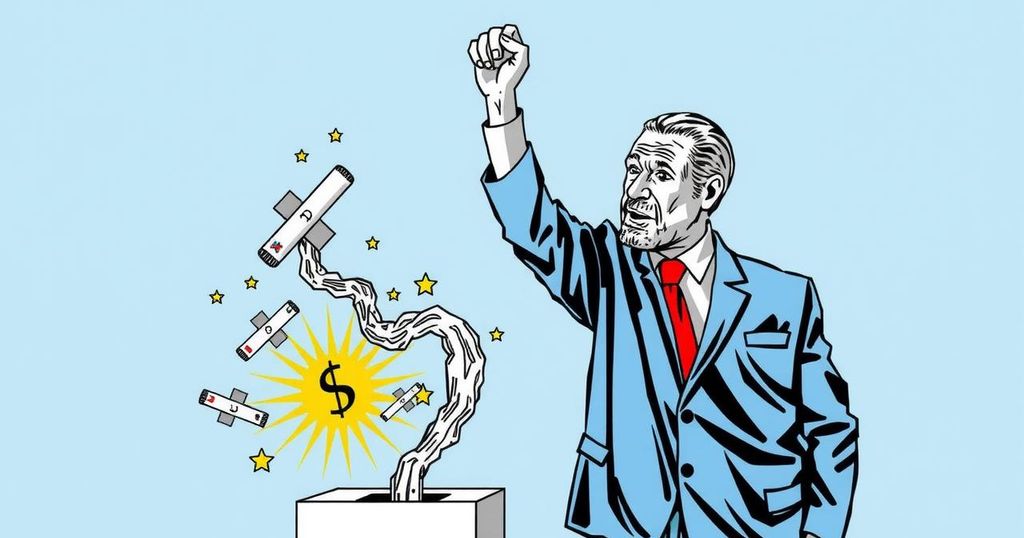Uruguay’s Shift: Yamandú Orsi Emerges Victorious in Presidential Election

Álvaro Delgado conceded to Yamandú Orsi in Uruguay’s presidential runoff election, after a tightly contested race. Orsi’s victory reinstates the Broad Front after its 15-year governance from 2005 to 2020, characterized by significant social reforms. The election reflects voters’ desire for a moderate approach amidst economic challenges and a focus on combating poverty and crime. The new administration aims to continue progressive policies while fostering political unity.
The incumbent president of Uruguay, Álvaro Delgado, conceded defeat to center-left candidate Yamandú Orsi in a closely contested presidential runoff election. While the vote count was still in progress, Delgado addressed his supporters with a message of acceptance, stating,
“with sadness, but without guilt, we can congratulate the winner.” Orsi, a former history teacher and mayor, accumulated 784,523 votes, narrowly surpassing Delgado’s 771,434 as electoral officials continued their tally.
Delgado’s concession follows the political landscape shift in Uruguay, where the conservative government, led by Luis Lacalle Pou, ended a 15-year rule by the Broad Front, recognized for its progressive social policies including the legalization of abortion and same-sex marriage. Orsi’s election not only signifies a continued commitment to moderate governance but also adds to a global trend where voters, disillusioned by economic hardships post-pandemic, rejected incumbents.
Orsi aims to implement policies resembling the Broad Front’s previous approach, advocating for tax incentives and reforms to lower the retirement age, yet steering clear of radical changes. His pragmatic stance aligns with the urgent need to address childhood poverty and organized crime. Despite ongoing economic recovery and growth rates predicted to reach 3.2%, Delgado’s campaign failed to resonate with voters concerned about stagnant wages and rising crime.
In a show of unity, both candidates expressed their willingness to cooperate if elected, emphasizing a shared commitment to public service. As Uruguayans look forward to this new chapter, the undisputed election of Orsi reaffirms the country’s political stability and tradition of democratic engagement.
In summary, Yamandú Orsi’s victory heralds the return of the Broad Front to power, indicative of the electorate’s desire for continuity in progressive governance amid challenging socio-economic conditions.
The recent presidential runoff election in Uruguay highlighted the nation’s political dynamics, where the conservative coalition that held power for five years faced significant challenges from the center-left Broad Front. This election occurred during a global trend of voter discontent, as many incumbent leaders faced backlash due to economic struggles exacerbated by the COVID-19 pandemic. Uruguay’s past five years under a conservative government had seen notable shifts in policy priorities, leading to voter fatigue and a reemphasis on the social policies championed by the Broad Front. Recognized previously for significant reforms such as the legalization of abortion and same-sex marriage, the Broad Front returned to the forefront of Uruguay’s political scene with Orsi’s election, indicating a desire for stability and a balanced approach to governance.
In conclusion, the transition of power to Yamandú Orsi marks a significant moment in Uruguay’s political history, as voters responded to longstanding economic frustrations by embracing a moderate candidate who affords continuity through established policies. With a focus on addressing critical social issues, Orsi’s leadership promises to uphold Uruguay’s legacy of progressive governance while fostering cooperation across political lines. The election serves as a reflective mirror to broader global sentiments, encapsulating the urgency for political leaders to adapt to their constituents’ evolving needs and expectations in the wake of recent challenges.
Original Source: www.pbs.org







